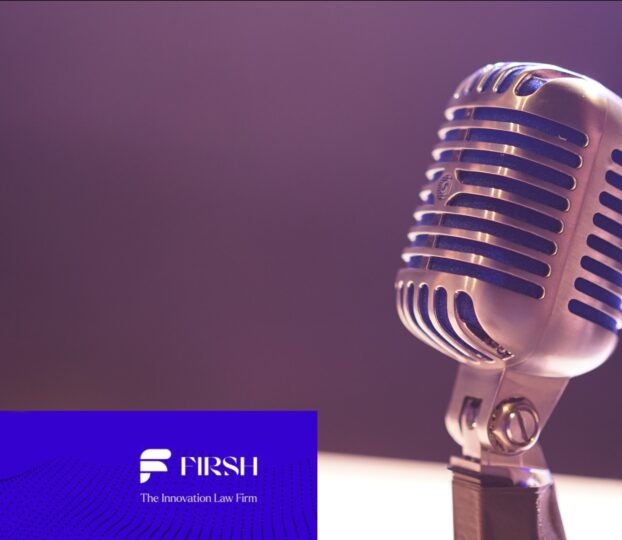
Newsletter 2025

✨ The FIRSH team wishes you a happy new year 2025! ✨
The Paris Olympic and Paralympic Games showed us:
🏋️♂️ All great accomplishments are achieved with audacity
🏆Nothing can be achieved without hard work and a close-knit team built up over the years.
🫱🏼🫲🏼FIRSH wishes you and your team a year full of audacity so that you can enjoy all your victories!
At your side, we are determined to support you with joy and good humor, and always in a business-oriented way to protect and defend your activities.
In an increasingly uncertain world, where Artificial Intelligence (but not only Artificial Intelligence) is becoming more and more important, having a team of lawyers you can trust is still a competitive advantage!
We thank you for your renewed confidence and wish you a year 2025 full of new innovative and responsible projects!
✨ ARTIFICIAL INTELLIGENCE ✨
➡️Generative IA and the legal profession : act rather than submit
At a time when generative artificial intelligence is developing rapidly, the Senate Law Committee has charged senators Christophe-André Frassa and Marie-Pierre de La Gontrie with assessing the impact of this technology on the legal professions.
Generative artificial intelligence has begun to transform our perception of technological tools and is already opening up opportunities in terms of time savings, productivity and improved access to the law.
On 18 December 2024, the Senate’s Law Committee adopted a report concluding the work of this taskforce, entitled ‘L’intelligence artificielle générative et les métiers du droit: agir plutôt que subir’. Twenty proposals were put forward, aimed at providing a framework for and supporting the integration of generative AI in the legal field, without making it a substitute for human experts.
Here are some key proposals:
- Ethics et transparency:
- Establish clear and transparent rules for the use of generative AI within each profession, in particular by drafting an ethics charter or user guide, which would then be implemented in each law firm or jurisdiction. Without requiring any legal obligation, advise in the user guides specific to each profession that, in the interests of transparency, the use of generative AI tools must not be concealed from the client.
- Confidentiality and public data:
- Anonymise judges and court clerks in court decisions published as open data.Secure the re-use of public information contained in court decisions handed down before legal data is opened up, in light of the prohibition on processing sensitive data established by the RGPD.
- Digital sovereignty:
- Encourage public authorities wishing to acquire legal artificial intelligence tools to give preference to those developed in France or within the European Union, in compliance with the French public procurement code and European regulations.
Rather than substitutes for lawyers, generative AI is seen as a strategic ally, improving productivity, speeding up access to the law and freeing up time for high value-added tasks.
FIRSH expert voice: Firsh, which already uses AI productivity tools and legal AI for its own needs, is implementing ‘off-the-shelf’ or ‘custom-made’ AI tools with technical service providers within legal departments and providing training for all employees while drafting the company’s legal and ethical usage charter. Don’t hesitate to move up a gear with AI to boost the productivity of your teams and focus on higher value-added tasks.
Find out more 👉 Report
✨DATA ✨
➡️6 communes receive formal notice for failing to use augmented cameras
Augmented’ cameras combine automated analysis software and video surveillance devices. They can film in real time while deducing precise information (counting people, leaving luggage behind, wearing masks, etc.). These technologies raise questions about their compliance with current regulations.
In its 2022-2024 strategic plan, the CNIL has targeted certain uses of automatic image analysis software. The CNIL has undertaken a series of inspections of the public prosecutor’s office and eight local authorities that use this type of technology.
While no use of facial recognition functions was found, three main types of use were identified:
- Automated detection of suspected offences on the public domain (banned parking, oncoming traffic, etc.) or ‘abnormal’ or even dangerous events (gatherings of people, etc.). These uses are in principle prohibited under current law;
- Traffic statistics (pedestrians, trucks, bicycles, push/electric scooters, etc.). This use is authorised, as long as users are sufficiently informed, which was not always the case;
- Automatic searches of images in response to legal requests (license plates, etc.). This use is legal, as long as it is necessary to respond correctly to the requisition and the system is sufficiently secure. Municipal police officers are therefore not authorised to carry out such searches on their own initiative, without a court order.
In response to the shortcomings observed, the CNIL issued formal notices to six communes, requiring them to make rapid adjustments to comply with the regulations.
FIRSH expert voice: Firsh can assist you in ensuring that your business complies with regulations on personal data.
Find out more 👉 Use of BriefCam and other video analysis software by the State and communes
➡️ Website publishers receive formal notice to modify their cookies banners, which are judged as misleading.
The CNIL recently sent formal notice to several website publishers to modify their consent banners for cookies, which were judged as misleading.
These banners, which are supposed to guarantee free and informed consent, have been the subject of complaints from Internet users alleging practices that do not comply with the legislation.
v Cookies can only be stored with the explicit consent of Internet users. Publishers are therefore required to comply with specific rules:
- Clear and comprehensive information on the purpose of cookies and how to object to them;
- A presentation that is not misleading, where the option to refuse cookies is as easy to access as the option to accept them.
The non-compliant practices identified by the CNIL are:
- The opt-out option is not very visible, due to a design that gives disproportionate prominence to the opt-in option (colour, font size and font);
- Intentional confusion between the opt-out option and the other information displayed;
- The opt-out option is difficult to distinguish from the other information on the banner;
- Abusive repetition of the opt-in option in clear terms, while the opt-out is mentioned only once with ambiguous wording (‘I decline non-essential purposes’).
The CNIL considered that these practices violated article 82 of the French Data Protection Act. The publishers were therefore ordered to correct their banners within one month in order to guarantee truly free, informed and valid consent.
FIRSH expert voice: Firsh assists you in setting up or bringing into compliance your cookies policy and the cookies banner on your website.
Find out more 👉 Cookies banners misleading: the CNIL sent formal notice to web publishers
➡️ KASPR has been sanctioned with a fine of €240,000 for, among other things, collecting contact details on LinkedIn from users who had chosen to limit their visibility.
KASPR develops and markets an extension for the CHROME browser that enables users to obtain the professional contact details of people whose profiles they visit on the LinkedIn social network.
On 28 July 2022, the CNIL carried out an investigation to verify the compliance of the personal data processing carried out by the company.
The violations found concerned several obligations of the GDPR:
- Lack of legal basis for the collection of personal data from LinkedIn contacts who had chosen to restrict their visibility.
- Disproportionate retention periods for the data collected, with automatic renewal practices judged to be abusive.
- Lack of transparency and information: data subjects were not informed clearly or in a language they could understand.
- Violation of the right of access: requests for information on the origin of data were not dealt with accurately.
The CNIL imposed an administrative fine of €240,000 and a daily penalty of €10,000. It also ordered the company to:
- Stop collecting data from LinkedIn accounts with restricted visibility settings.
- Delete or inform the persons concerned by the data already collected.
- Review the data retention policy and stop automatic renewals.
- Improve transparency and respond accurately to access requests.
FIRSH expert voice: determining the legal framework is a prerequisite before setting up any personal data processing. Firsh assists you in this preliminary analysis to ensure the compliance of your processing activity.
Read the full judgment👉 Deliberation SAN-2024-020 of 5 December 2024
✨ INTELLECTUAL PROPERTY ✨
➡️ Trademark
On 20 December 2024, the Paris Court of Appeal found that the ‘WELCOME’ trademark infringed the earlier ‘BIENVENUE’ trademark, which was used in particular for cosmetic products. It upheld the INPI’s decision by establishing a likelihood of confusion between the two trademarks, based on their conceptual similarity.
🔍 What should be noted?
Although WELCOME and BIENVENUE differ visually and phonetically, they share an identical conceptual meaning: the English word ‘WELCOME’ is the literal translation of the French word ‘BIENVENUE’.
The average consumer of cosmetic products, with a basic knowledge of English, is familiar with the word ‘WELCOME’ and will easily associate it with its translation.Le consommateur moyen de produits cosmétiques, muni de notions élémentaires d’anglais, est familier du mot “WELCOME” et l’associera facilement à sa traduction.
The strong distinctiveness of the ‘BIENVENUE’ trademark for cosmetic products reinforces its protection and increases the risk of association with ‘WELCOME’.
⚖️ Legal implications:
This decision reinforces the principle that a trade mark should not be appraised solely on its visual and phonetic aspects. Conceptual similarity, combined with the strong distinctiveness of an earlier trademark, may be sufficient to establish a likelihood of confusion. Trademark owners must therefore be vigilant when registering signs that are likely to recall, even conceptually, an existing trademark in the same product field.
FIRSH expert voice: can assist you in administrative disputes before trademark offices and in legal disputes concerning trademarks, to ensure that your rights are defended.
➡️Copyright : protection for an original combination
The Paris Court of First Instance upholds copyright infringement in the combination of the set of copied cards
On 20 December 2024, the Paris Court of First Instance handed down a significant decision in a case between ATM Gaming, the creator of the Juduku game, and Mr B., developer of the Toz mobile application, which copied 69 questions from the Juduku game in its mini-game entitled ‘7 seconds’.
ATM Gaming thus requested that Mr B. be sentenced to pay 400,000 euros for infringement, 200,000 euros for moral prejudice, and in the alternative 500,000 euros for unfair competition, and in any event that Mr B. be prohibited from representing an application that constituted a slavish copy of the Juduku game, that publication measures be taken and finally that Mr B. be ordered to pay 10,000 euros under Article 700 of the French Code of Civil Procedure.
In its decision, the court acknowledged that the combination of questions in the Juduku game, their selection in keeping with the spirit of the game, and their overall implementation reflected a set of creative choices reflecting the personality of their author, and that these combined elements thus constituted a work protected by copyright. However, neither the rules of the game nor the questions taken in isolation were eligible for copyright protection.
The court dismissed the unfair competition claim, ruling that the other similarities between the two games (mechanisms, general themes, slogan ‘Spice up your evenings’) were too generic to constitute unlawful appropriation.
Sanctions :
- Removal of the 69 copied questions under penalty
- €5,000 in damages for economic and moral loss, well below the €400,000 claimed by ATM Gaming.
Link of the ruling : Tribunal Judiciaire de Paris, 3rd ch., 2nd sec., 20 december 2024, n°22/0838
✨ FIRSH NEWS ✨
Find out more about Firsh’s contributions to the advancement of law and innovation:
➡️ Our founding partner, Claire Poirson shed some legal light on the legal uses of trackers on TF1’s 8 o’clock news, one of the major French TV channel.
Watch a replay of the program 👉 https://www.tf1.fr/tf1/jt-20h/videos/le-jt-de-20-heures-de-tf1-du-dimanche-29-decembre-2024-42363755.html
➡️ As part of its innovation laboratory, FIRSH has published its first White Paper! Ill marks the official launch of FIRSH LAB, which has published its first study on a high-stakes social issue: deepfakes (hypertrucages generated by artificial intelligence). This White Paper, after a documented study of the technical aspects and a legal reflection on the texts in presence of the doctrine and court decisions, gives legal and practical recommendations: to public authorities, to companies as well as to individuals.. This White Paper represents more 6 months of work, more than 6 months of research, legal analysis, drafting, corrections, reflection and rich interviews with French and foreign experts in artificial intelligence, both technical and legal, to understand a major social issue with multiple stakes, and to provide concrete solutions for all players in society, from schools to public authorities.
To receive your copy of the White Paper, please contact us at👉 contact@FIRSH.LAW
➡️ In December, Firsh assisted its customers with the following projects:
- Drafting and filing of pleadings before the Bordeaux and Toulouse Courts of Appeal in matters of trade mark and copyright infringement, unfair competition and parasitism, and enforcement of court rulings
- Drafting and filing of pleadings in arbitration before the Paris Chamber of Commerce and Industry (CCI) in a case involving the brutal and abusive termination of a software distribution contract
- Pre-litigation of trademark infringement, unfair competition and deceptive trade practices for a major electric car brand.
- Drafting and negotiation of a contract for the assignment of copyright in perfume bottles in the cosmetics sector for a major luxury brand
- Drafting and various contract reviews in the fields of intellectual property, personal data and information technology
- Audit “Intellectual Property, Tech, data, AI” concerning a company that has developed a decarbonation platform
📢 To follow us on LinkedIn and receive our newsletter, click here : https://www.linkedin.com/company/firshlaw/.
📢 There is no direct collection of your personal data and therefore no emailing from Firsh!


